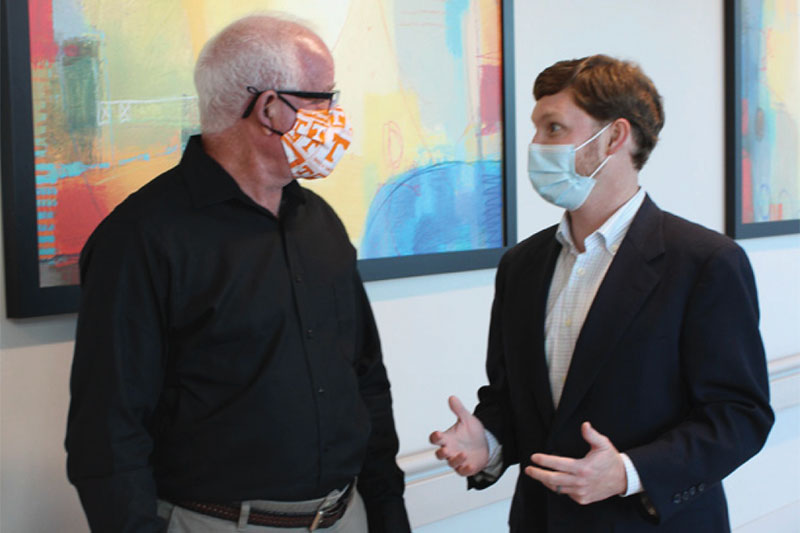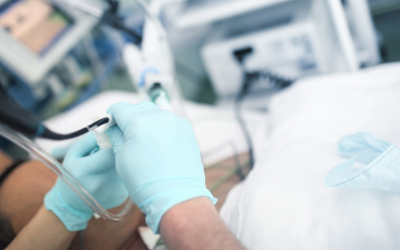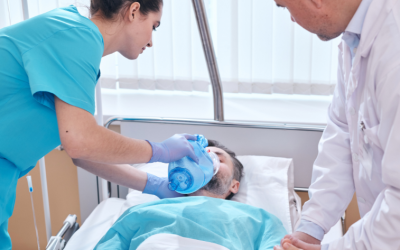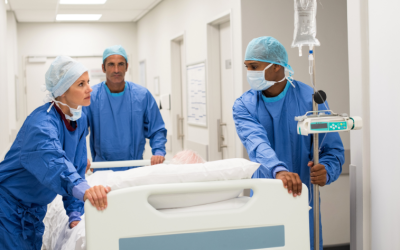Parkwest Patient is Region’s First to Benefit from New “GPS” Technology
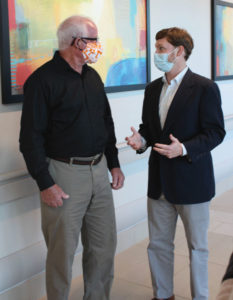
Russell and Dr. Kennon visit after his six-week post-operative check up.
It’s the perfect pairing of technology and human intellect. Using precise measurements, surgeon Justin Kennon, MD, navigates a reverse total shoulder replacement using GPS technology.
In this case, GPS stands for guided personalized surgery. Parkwest Medical Center and Dr. Kennon are the first hospital in East Tennessee to offer this new and advanced computer system that precisely guides surgeons during procedures.
“It’s all the benefit of preoperative planning and computer-assisted surgery technology combined with my intraoperative decision making,” Dr. Kennon explains. “The combination of robotic-like technology with shoulder fellowship experience is an absolute game changer for patient outcomes.”
With a CT-scanned, 3D model of the patient’s shoulder, Dr. Kennon can plan the perfect procedure ahead of time and before the first incision.
“I’m able to visualize the patient’s shoulder blade and ball and socket joint,” Dr. Kennon says. “I am able to plan the implant size and position, both before surgery and using interactive feedback during surgery. This advancement allows me to better understand the implant and shoulder dynamics before we ever get to surgery.”
The Best Route
Dr. Kennon compares this technology to using a car’s GPS to get to a new destination. “You can go down back roads and get lost a few times and eventually find your way there, but it’s much easier and more precise to put the location into the GPS,” Dr. Kennon says. “You get there precisely, efficiently and effectively. Better outcomes mean that everybody’s happier in the end.”
Going into surgery, Dr. Kennon has a preoperative plan that is specific and customized to each patient. As the surgery is being performed, he has the guidance he needs to make sure he is following the patient’s personalized plan down to the finest details.
“Every time I move my hand one way or the other – a little left, a little right, a little up, a little down – it tells me in real time whether or not I am exactly where I thought I was and whether or not I’m executing that plan perfectly,” Dr. Kennon says.
Extensive shoulder and elbow fellowship training at the Mayo Clinic fueled Dr. Kennon’s passion for using technology to achieve better results for patients. He wanted to bring the benefits of that technology home to East Tennessee.
“This has been exciting for me because I pride myself in providing excellent patient care as a doctor, as well as providing topnotch patient outcomes,” Dr. Kennon says. “Any tool or technology that allows me to get closer to that perfect outcome is exciting for me.”
Shouldering a Burden
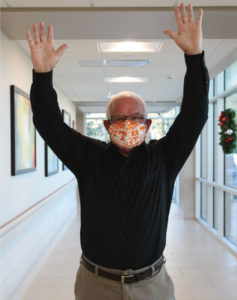
Russell shows off his newly found range of motion after having GPS-guided shoulder replacement surgery.
The first patient to undergo a shoulder replacement with the new technology was Ray Russell, 71, of Dandridge. He says he knew that a shoulder replacement was the only way to ease his pain and restore his mobility.
“I’m an ol’ country boy and I’ve worked since I was 8 years old,” Russell says. “My uncles were all construction people. I worked for them every summer and even during breaks from school, pulling wires, doing electrical work, framing houses, carrying concrete block, carrying shingles or putting shingles on a roof.”
He had undergone rotator cuff surgery on both shoulders, which helped.
However, this would not solve his problems forever, and eventually the piercing pain began to creep back in. “My right shoulder started hurting and I couldn’t lift it up anymore,” Russell says. “I couldn’t reach anything … something as simple as a coffee cup, medicine, or plates for my wife …”
After shoulder replacement with GPS guidance, he is no longer held back by the pain. “I can reach things in the cabinet, I can reach the towels – things like that I couldn’t do before,” Russell says. “I’ve been raking leaves and mowing the yard with a riding lawn mower. That type of thing used to be hard to do because of the pain in my shoulder.”
He can even lift his arms to celebrate a Tennessee touchdown during football season this year. Dr. Kennon says seeing quality of life restored in patients like Russell makes the investment in new technology completely worthwhile.
“We’re really breaking ground,” Dr. Kennon says. “As a surgeon, it’s outstanding to lead the way to better outcomes here in East Tennessee, but more importantly, I feel we owe it to our patients to provide the best care and treatment possible.”

